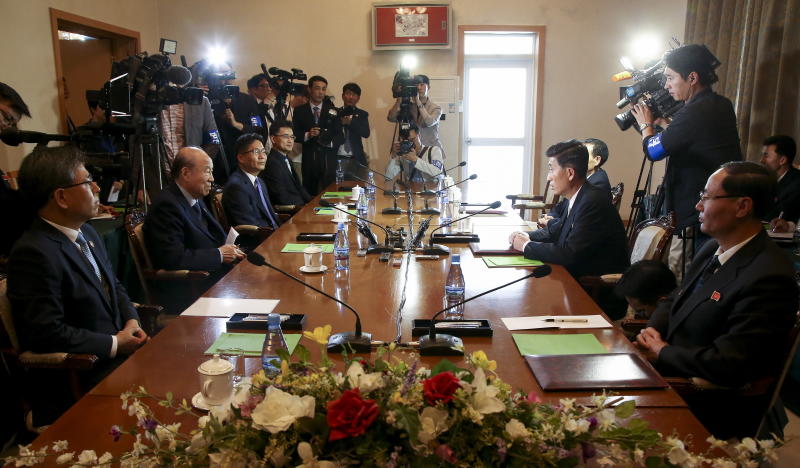North, South Koreas to hold reunions for war-separated families in August
Sign up now: Get ST's newsletters delivered to your inbox

Officials from both sides met at the North's scenic Mount Kumgang resort on June 22, 2018, and set a date for the reunions for late August 2018.
PHOTO: EPA-EFE
Follow topic:
SEOUL (AFP, REUTERS) - North and South Korea agreed Friday (June 22) to resume reunions for families separated by the Korean War in August - the first such meetings since 2015 and the latest step in a remarkable diplomatic thaw on the peninsula.
Millions of people were separated during the 1950-53 conflict that sealed the division of the two Koreas.
Most died without the chance to see or hear from their relatives on the other side of the border, across which all civilian communication is banned.
The resumption of the reunions was among the agreements reached between North Korean leader Kim Jong Un and the South's president Moon Jae-in at their landmark summit in April.
Officials from both sides met at the North's scenic Mount Kumgang resort on Friday and set a date for late August.
"The reunion will be held from Aug 20 to 26 and 100 participants will be selected from each side," said a joint Seoul-Pyongyang statement released by the South's unification ministry. The reunions will be held at Mount Kumgang, the two sides said, with 100 people from each side to be chosen to meet long-lost relatives from the other side.
"The whole world is marvelling at the amazing developments between the North and South," said Pak Yong Il, the leader of the North Korean delegation at the talks.
South Korean officials will begin inspections of the Mount Kumgang resort from next week and the two sides will exchange their final lists of participants by Aug 4, it added.
Only about 57,000 people remain alive who are registered with the South Korean Red Cross to meet their separated relatives, and most are aged over 70.
For the lucky few chosen to take part, the experience is often hugely emotional, as they are given just three days to make up for decades of time apart, followed by another separation at the end - in all likelihood permanent.
The reunion programme began in earnest after a historic inter-Korean summit in 2000 and the reunions were initially held annually, but strained cross-border relations have made them rare.
North Korea has a lengthy track record of manipulating the issue of divided families for political purposes, refusing proposals for regular reunions and cancelling scheduled events at the last minute.
Pyongyang has previously said it will not agree to family reunions unless Seoul returns several of its citizens, including a group of waitresses who defected from a restaurant in China.
It is unknown whether the defectors were brought up at Friday's meeting, but the two sides agreed to continue discussions on "humanitarian issues" through further Red Cross talks, according to the joint statement.
The rapprochement on the Korean peninsula was triggered earlier this year when Kim decided to send athletes, cheerleaders and his sister as an envoy to the Winter Olympics in the South.
Diplomatic efforts have gathered pace since then, leading to a landmark summit between Kim and US President Donald Trump in Singapore earlier this month.
South Korean officials have often called for the visits to resume as a "humanitarian and human rights issue", especially since many individuals are now in their 80s and 90s. The first reunions were held in 1985. About 20 have been held since then with the last in 2015.
'PART WITH THE PAST'
Since 2000, about 23,676 separated Koreans, from both North and South, have met or interacted through videolink as part of the programme, the Hyundai Research Institute think-tank said.
But time is running out. By March, 56 percent of the 131,531 South Koreans who applied to take part in reunions had died, it said. It was not clear if North Korea had dropped a condition it had previously set for resuming the reunions - that South Korea return 12 North Korean women who worked at a North Korea-run restaurant in China and defected to the South in 2016.
Several of the women said in May they were coerced into leaving, while South Korean officials said they were trying to verify their accounts. As recently as May the North Korean Red Cross organisation urged South Korea to return the women "without delay".
The 1950-53 Korean War was concluded only with a truce, not a peace treaty, leaving the combatants technically still at war, with the so-called demilitarized zone between them one of the Cold War's most heavily fortified borders.
Pak, the deputy head of the North's agency to promote reunification, the Committee for the Peaceful Reunification of the Fatherland, called for the past to be set aside.
"We should also part with the past and go down the road our leaders have forged for us," he said.

